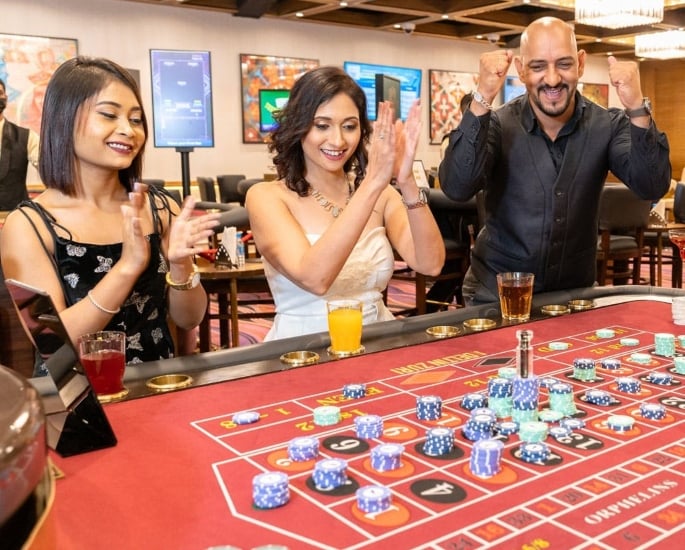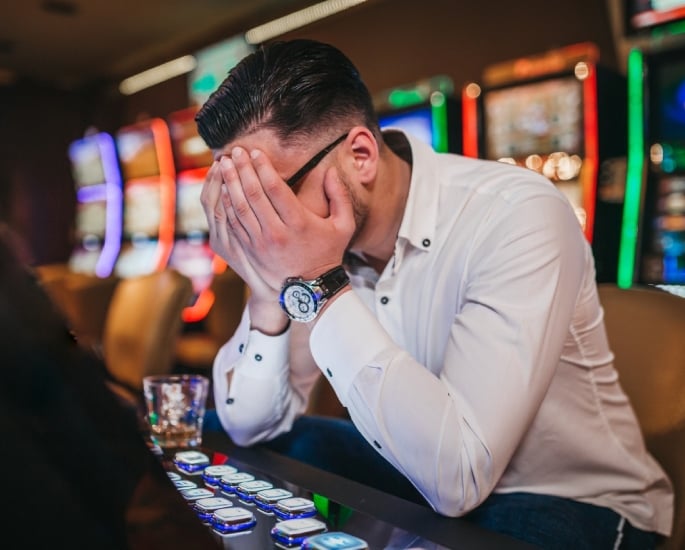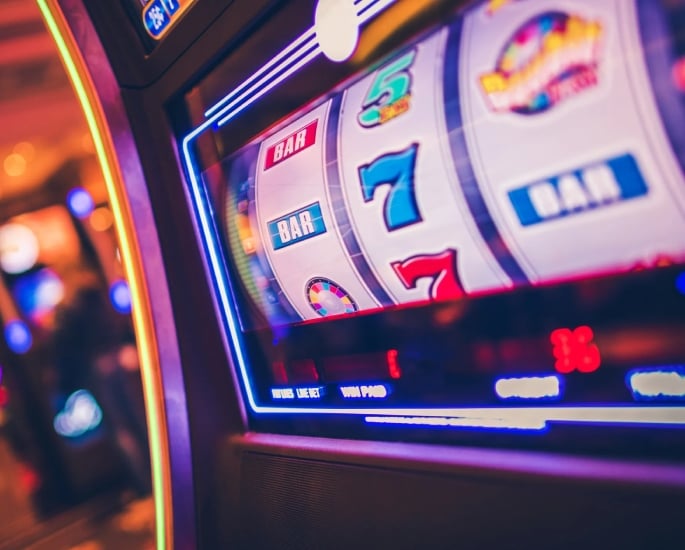Gambling addiction is a prevalent problem around the world, and the UK is no exception.
According to Providence Projects and a 2020 YouGov survey, there are over 430,000 problem gamblers in the UK with 13% of the population “experiencing some level of gambling harm”.
However, this issue is more complex in British Asian communities.
Whilst gambling and being in some sort of debt are recognised, gambling addiction is still a hushed topic in the culture.
There is a lack of resources and open platforms allowing British Asians to discuss problems related to gambling.
This is because a lot of communities and families judge those who are affected and dismiss the severity of this addiction.
DESIblitz will explore the impact of gambling on British Asians and hear from individuals who have personally been affected.
What is a Gambling Addiction?

A gambling addiction, also known as a gambling disorder, is a type of behavioral addiction characterised by persistent and recurrent problematic gambling behavior.
Many people who become addicted chase wins, meaning they feel they have to bet more to make up for the money they’ve already lost.
You can bet money on a range of things such as sports, politics, and even reality shows.
Even more subtle methods of gambling such as scratchcards can ignite an addiction.
People with a gambling addiction may feel an uncontrollable urge to gamble, even when it negatively impacts their personal, social, and financial life.
A gambling addiction can manifest in a variety of ways, such as:
- Spending more money and time on gambling than intended
- Experiencing intense cravings or urges to gamble
- Continuing to gamble despite negative consequences such as financial problems or strained relationships
- Lying to conceal gambling activities
- Relying on others for financial support due to gambling losses
Like other types of addiction, gambling addiction can have a significant impact on a person’s mental and physical health.
It can lead to anxiety, depression, insomnia, and other stress-related disorders.
British Asians and Gambling

Gambling addiction is a stigma in British Asian communities, with many people viewing it as a shameful and taboo topic.
There is a cultural belief that gambling is a form of vice and should be avoided, which makes it harder for those who suffer from gambling addiction to seek help.
In many households, individuals who gamble are judged harshly, which often leads to a lack of communication and a reluctance to seek help.
According to a study conducted by the Royal Society for Public Health, British Asians are more likely to develop gambling addictions than any other ethnic group in the UK.
The study found that 44% of British Asians reported having gambled in 2019, compared to 38% of white British people.
Additionally, the study found that British Asians were more likely to experience negative consequences as a result of their gambling, such as debt and relationship problems.
Furthermore, a report published by the Gambling Commission in 2020 found that British Asians were overrepresented in the category of “problem gamblers” in the UK.
The report found that 8.5% of British Asian respondents were problem gamblers, compared to 7.2% of white respondents.
In relation to this, the National Problem Gambling Clinic found:
“23% of our clients are of South Asian descent, despite only accounting for 7% of the UK population.”
According to a report by the Institute for Public Policy Research, British Asians are more likely to become addicted to fixed-odds betting terminals (FOBTs) than any other ethnic group.
FOBTs are high-stakes electronic gaming machines commonly found in betting shops.
The same report also found that British Asian women are particularly vulnerable. It revealed the rates of problem gambling among this group are higher than any other ethnic or gender group in the UK.
Additionally, The National Centre for Social Research found that British Asians were more likely to participate in certain forms of gambling, such as playing the lottery or scratchcards than other ethnic groups in the UK.
British Asians are also more likely to have gambling problems than other ethnic groups in the UK, with nearly 1 in 20 being problem gamblers.
These statistics highlight the need for greater awareness and support for gambling addiction within British Asian communities.
The Impact on British Asians

With such a high proportion of British Asian gamblers, it’s important to highlight their own stories.
The hope is that their experiences will not only shed light on this issue but urge others to be more frank and open with their addiction(s).
First, we spoke to 35-year-old Sunny* from Sheffield who said:
“I started gambling when I was in college.
“It started with small bets on football matches, but soon I was betting on horse races and casino games.
“I would spend hours online or in bookies, placing bets and losing money. I was always in debt and had to borrow money from friends and family to pay my bills.
“My addiction cost me my job and I had to move back in with my parents. They were ashamed of me and didn’t understand why I couldn’t stop.
“It was only when I joined a support group that I realised how serious my addiction was. I am now in recovery and have not placed a bet in over a year.”
Adding to this was 45-year-old Farhan* from Barnsley who revealed:
“I started gambling when I was in my 20s. I was drawn to the thrill of the casino and would often spend all my money on the slot machines.
“My addiction got worse when I started playing online poker. I would stay up all night, playing for hours and losing thousands of pounds.
“I kidded myself thinking this was just a thing to pass the time. Because I staked big, the returns were bigger. So, I found myself chasing that thrill.
“But the house always wins.
“I would lie to my wife and children about where I was and what I was doing.
“My wife found out about my addiction and it nearly ended our marriage.
“I have been in therapy for several years and am slowly rebuilding my relationship with my family.”
Additionally, Jasmine*, a 25-year-old student from Birmingham shared her experiences:
“I was going through a tough time in my life and started to play online games.
“There were a lot of ads from betting sites where you sign up and they’ll give you £20 to spend on slots or £50 in free bet credits.
“I was at uni and thought I had nothing to lose and it seemed like a good incentive.
“I was struggling with depression and anxiety and found that gambling provided a temporary escape.”
“I’d spend hours playing online games and placing bets on sports matches.
“The worst thing is I didn’t even watch sports but because I had won a few small bets before (by luck), I carried on.
“I mistook the wins for happiness so I associated winning a bet with ‘curing’ my depression. But how wrong I was.
“I spent all my savings and even took out loans to fund my addiction. I lost my job and had to move back in with my sister because I was too afraid to tell my parents.
“She was disappointed in me and it made me feel even more isolated. It was only when I sought professional help that I was able to confront my addiction.
“I am now in recovery and am learning to manage my mental health without relying on gambling.”
27-year-old Anjali* from Birmingham was also at university when her addiction started:
“I would play online slots and poker with my friends, thinking it was just harmless fun.
“But soon I was spending all my money on gambling and would skip lectures to play. I fell behind in my studies and had to drop out of university.
“I was too ashamed to tell my parents, so I started working low-paying jobs to fund my addiction.
“It wasn’t until I was arrested for stealing from my employer that I hit rock bottom.
“Although I am still yet to get the proper help, speaking about it and admitting I have an issue has been a big step. The next one to take is to go to therapy.”

38-year-old Imran* from Coventry also provided us with his story:
“I would bet on everything from horse racing to cricket matches.
“I would often spend my entire monthly payslip on gambling and would lie to my wife about where the money was going.
“At first, I was winning money and thought I had found a way to make easy cash. But soon I was spending more than I was winning and was in debt.
“I would lie to my wife and say I was putting the money into our savings account.
“But, I was addicted to the thrill of winning and would spend all my money on gambling. It got to the point where I couldn’t afford to pay my rent or bills.
“I had to tell my dad what was going on and my parents were devastated.
“They had always been proud of my achievements and this was a huge blow to them.
“Things became worse because when I went to my parent’s house, they thought I was coming over to talk, but I’d look around to see if they had spare notes in their wallet.
“That’s something that haunts me to this day. I stole from my own parents in order to gamble.
“I didn’t know who to turn to because I was ashamed of what I had become.”
“And I knew just how much of a burden I’d be to everyone if I admitted to my addiction.
“I’m still yet to seek help and have confided in my wife and friends to keep me on the right track.”
We also spoke to Jenna*, a 45-year-old nurse from London. She explained the difficulties of living with her husband who had a gambling addiction:
“My husband’s gambling addiction affected our family deeply.
“He had been gambling for years, but I had no idea until our finances began to suffer.
“He had maxed out our credit cards and had even taken out loans to continue gambling. When I tried to find him help, no one was willing to speak to him.
“They said he was greedy and it’s his own problem to sort out. That’s part of the issue in our culture, no one is willing to help, especially with gambling.
“I agree these addictions are caused by a person’s own decisions, but you have to admit things can go beyond their control.
“But my husband was in denial about his own addiction and refused to seek help, which led to a lot of tension in our marriage.
“I eventually left my husband and sought counselling to help me cope with the trauma of his addiction.
“I was a very carefree spirit before and treated myself, friends, and family to anything they wanted. But now I barely spend any money – even on my kids.
“I’m so scared of being in a position like I was before where I thought I’d become homeless. This is a real issue that affects everyone involved and something has to change.”
These personal stories are just a few examples of how gambling addiction can affect British Asians.
It’s important to share these stories and break down the stigma surrounding this issue so that individuals can seek the help they need.
Getting Help

Gambling addiction is a serious problem in British Asian communities, but it’s also a taboo topic that many people are hesitant to discuss.
However, by sharing personal stories and raising awareness about this issue, we can break down the stigma surrounding gambling addiction and encourage more individuals to seek help.
It’s important to remember that gambling addiction is a treatable illness, and with the right support, individuals can overcome this addiction and move towards a healthier and happier life.
Here are some resources that can help:
If you or know someone struggling with gambling addiction, reach out for help.
